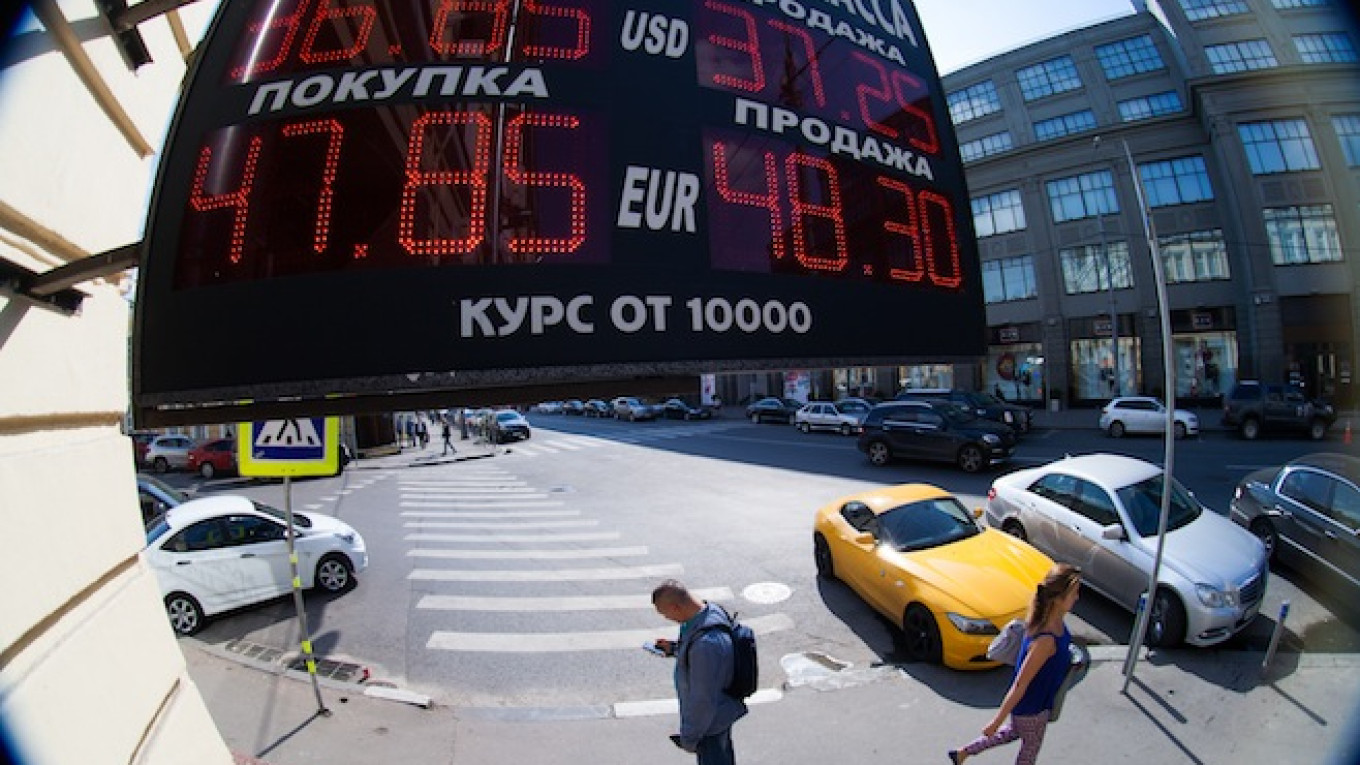The Russian ruble continued to set records Friday, dropping to another historic low against the dollar, as analysts said there was no immediate end in sight for the currency's downward spiral.
Driven by ongoing tension in Ukraine, new Western sanctions and a weakening oil price, the ruble's decline is stoking inflation and hitting consumers while the government is enjoying windfall tax revenues from exporters.
The currency dived after trading began in Moscow, and fell further on the announcement of the details of new European Union sanctions against Russia and expectations of harsher U.S. measures to come later in the day.
At about 6 p.m., a dollar was briefly worth 37.93 rubles, the Russian currency's weakest moment against the greenback since 1998, when the ruble was restructured in the throes of economic crisis.
“Geopolitics is the main factor moving the ruble,” said Vladimir Tikhonov, chief economist at BCS Financial Group in Moscow.
The ruble has lost 15.4 percent of its value against the dollar since the start of the year and hit four historic lows — three of them in the last fortnight as the EU and the U.S. announced growing evidence of a full-scale Russian military incursion inside Ukraine and a new round of sanctions.
The previous record bottom for the ruble vis-a-vis the dollar was on March 3, when Russian troops were fanning out across the southern Ukrainian region of Crimea in the initial stages of a Kremlin annexation.
At the end of Friday, the ruble was trading at 37.79 to the dollar.
A euro cost just under 49 rubles, about two rubles stronger than the low point of 51, struck in mid-March.
'Relentless' Fall
With investors expecting Kremlin retaliation, there is little sense that the currency is about to turn a corner. The ruble's run of weakness appears to be “relentless,” one U.S. investment bank said in an emailed note to clients on Friday.
A weak ruble is bad news for importers and consumers, who face price rises and inflation, but it generates bumper revenues for Russian exporters, particularly energy giants that sell their goods for foreign currency.
Devaluation on Friday was further spurred by the Central Bank, which opted to keep interest rates on hold at 8 percent despite rising consumer prices. The ruble's fall has added almost 1 percentage point to inflation, Central Bank chairwoman Elvira Nabiullina was quoted by Reuters as saying.
“The situation now isn't simple and there is high uncertainty about the further development of events,” Nabiullina told reporters after Friday's rates decision.
The ruble is not alone among international currencies — other emerging market currencies have fallen in recent weeks — but the ruble has fallen hardest.
In particular, the ruble has been dragged lower by the dropping oil price. The price of Brent crude fell below $100 a barrel earlier this week, a 17-month low, amid ample supplies and fears of an economic slowdown in Europe.
Determined to Free-Float
The Russian currency's decline has also been underwritten by the Central Bank's move toward a free floating currency, which it aims to implement fully by 2015.
While the Central Bank conducted enormous interventions in March to prop up the ruble as the Ukraine crisis worsened, it has been entirely passive in recent weeks.
The current trading corridor, which has been moved 42 times this year, is so wide that the Central Bank will not be obliged to intervene until a dollar is worth about 39 rubles, economist Tikhonov said.
Data on the regulator's website shows that it has not made any interventions on the currency markets since June, the longest such period since before the 2008 economic crisis.
“The 38.00 mark doesn't look unachievable next week against the background of the lack of an initiative to exit from the [Ukraine] crisis either from Russia or Europe,” Yevgeny Koshelev, an analyst at Rosbank, wrote in a commentary published by Prime business news agency.
Contact the author at [email protected]
A Message from The Moscow Times:
Dear readers,
We are facing unprecedented challenges. Russia's Prosecutor General's Office has designated The Moscow Times as an "undesirable" organization, criminalizing our work and putting our staff at risk of prosecution. This follows our earlier unjust labeling as a "foreign agent."
These actions are direct attempts to silence independent journalism in Russia. The authorities claim our work "discredits the decisions of the Russian leadership." We see things differently: we strive to provide accurate, unbiased reporting on Russia.
We, the journalists of The Moscow Times, refuse to be silenced. But to continue our work, we need your help.
Your support, no matter how small, makes a world of difference. If you can, please support us monthly starting from just $2. It's quick to set up, and every contribution makes a significant impact.
By supporting The Moscow Times, you're defending open, independent journalism in the face of repression. Thank you for standing with us.
Remind me later.


